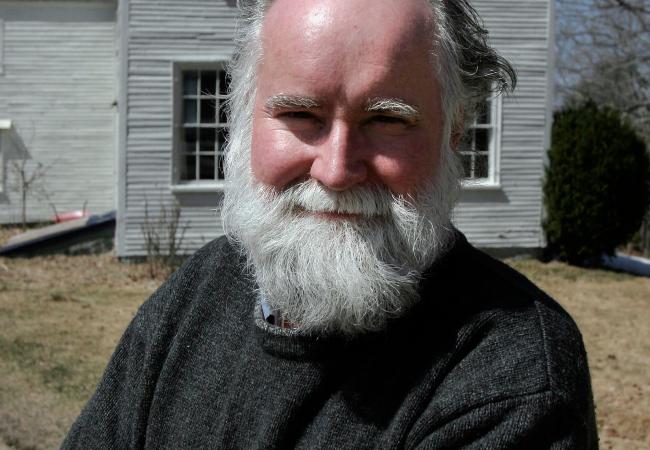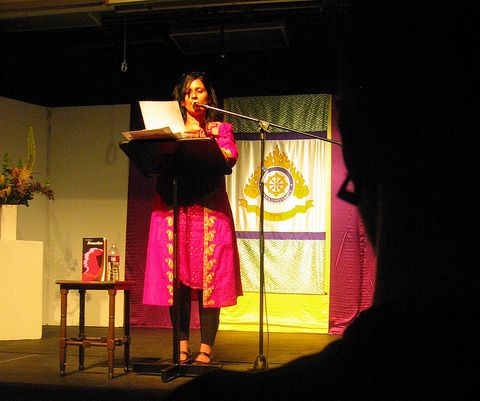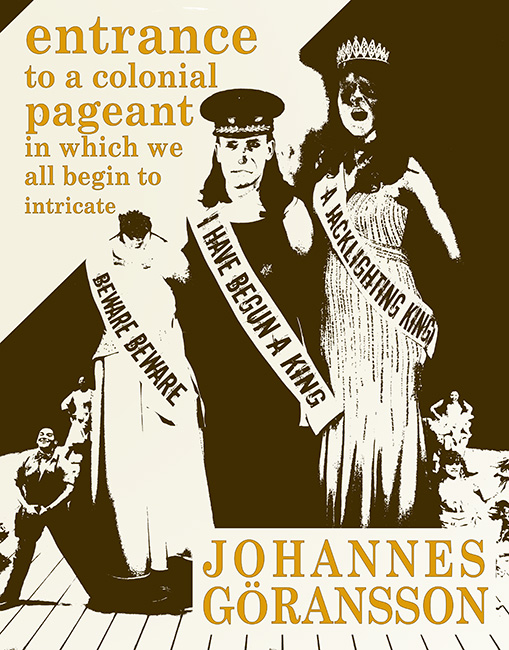This is great. Baby on the Safe Side. A collection of poems written by Sarah Bartlett and Emily Kendal Frey, available for free reading from Publishing Genius. Add them to your Tuesday reading list. These 20 poems are funny and trenchant like crazy, and they make for a fast read. I laughed a lot, then cracked my knuckles and said “ex-cellent.” The kids are all right. Aren’t they?
It looks like Open City is closing its pages—a real shame. Issue 30 will be their last and it’s only $10.
Nicholson Baker Interview
 Have you checked out the Writers at Cornell interview series? The latest installment is twenty-five minutes of Nicholson Baker answering to J. Robert Lennon’s questions about formal experimentation, John Updike, libraries, Human Smoke, and so on. Also worth your time (all of these interviews are downloadable MP3’s): Lydia Davis, Julia Alvarez, Terrance Hayes, Patrick Somerville, Alison Bechdel, George Saunders, and Junot Diaz.
Have you checked out the Writers at Cornell interview series? The latest installment is twenty-five minutes of Nicholson Baker answering to J. Robert Lennon’s questions about formal experimentation, John Updike, libraries, Human Smoke, and so on. Also worth your time (all of these interviews are downloadable MP3’s): Lydia Davis, Julia Alvarez, Terrance Hayes, Patrick Somerville, Alison Bechdel, George Saunders, and Junot Diaz.
What is Experimental Literature? {Five Questions: Bhanu Kapil}

Bhanu Kapil teaches in The Jack Kerouac School of Disembodied Poetics at Naropa University and at God(d)ard College. She has a blog with a loyal following in Croatia, Mongolia, and Pakistan: “Was Jack Kerouac a Punjabi? [A Day in the Life of a Naropa University Writing Professor].” She has written four books: The Vertical Interrogation of Strangers (Kelsey Street Press), Incubation: a space for monsters (Leon Works), humanimal [a project for future children] (Kelsey Street Press), and Schizophrene (forthcoming, Nightboat.)
Read Away Your Tuesday
Nine short stories (from Kvashay-Boyle, Kwon, Mikesch, Lacher, Campbell, Gay, Traverse, Kesey, and Danticat), an interview with Harry Mathews, and an e-chapbook of poems by Letitia Trent. Here they are:
 1. “Saint Chola,” by K. Kvashay-Boyle.
1. “Saint Chola,” by K. Kvashay-Boyle.
An excerpt:
Skater. Hesher. Tagger.Lesbo-Slut. Wanna-be. Dweeb.Fag. Prep. What-up.Nerdy. Trendy. Freaky. In a few weeks it’ll be solid like cement, but right now nobody knows yet. You might be anything. And here’s an example: meet Mohammadee Sawy.
2. “Superhero,” by Reese Okyong Kwon.
An excerpt:

When she was very young, her mother had explained her name to her. “You were named after one of the youngest saints,” her mother told her as she brushed her hair. “A martyr. She believed in God, but her father was a strict Roman nobleman and forbade her from praying under pain of death. When she persisted, her father had her whipped until she died. She was twelve or so.
Silver Sparrow by Tayari Jones
 Silver Sparrow, by Tayari Jones, is a novel where you know, from the first page, what the major tensions of the narrative are. You also get a sense of how the story will end. This is not to suggest that this novel is without its surprises or complexities; you will find both in this book. Nonetheless, Silver Sparrow is a book where how the writer leads the reader to an inevitable ending matters most. Normally, this approach of revealing so much of what is at stake in the early going might seem like a prescription for failure but such is not the case in what is a remarkable novel. Silver Sparrow is thoroughly engaging and although there is so much intense emotion driving the story forward, that emotion is expertly controlled, never becoming indulgent or melodramatic. We all come to reading for different reasons. I mostly read to be moved and engaged; with this book I very much was. I haven’t been able to stop reading this book since I got my hands on a copy.
Silver Sparrow, by Tayari Jones, is a novel where you know, from the first page, what the major tensions of the narrative are. You also get a sense of how the story will end. This is not to suggest that this novel is without its surprises or complexities; you will find both in this book. Nonetheless, Silver Sparrow is a book where how the writer leads the reader to an inevitable ending matters most. Normally, this approach of revealing so much of what is at stake in the early going might seem like a prescription for failure but such is not the case in what is a remarkable novel. Silver Sparrow is thoroughly engaging and although there is so much intense emotion driving the story forward, that emotion is expertly controlled, never becoming indulgent or melodramatic. We all come to reading for different reasons. I mostly read to be moved and engaged; with this book I very much was. I haven’t been able to stop reading this book since I got my hands on a copy.
The first chapter is entitled, “The Secret,” and that early revelation sets the tone. If there’s a secret, there’s something worth hiding and someone who does not know what is being hidden and there’s likely to be trouble. If there’s a secret, the truth is, eventually, going to come to light. That’s a lot of what this novel is about—the narrative slowly, carefuly bringing to light a truth many people are complicit in keeping hidden and what that deception ends up costing every one involved.
March 1st, 2011 / 11:30 am
Great Sheentences: “I don’t have burnout my gearbox. I just go.” and “Everything after but is dial tone.” Joyce and Beckett, respectively. And Jean Cocteau said this: “It is excruciating to be an unbeliever with a spirit that is deeply religious.” He sleeps with a good mask, behind the click. And Mike Meginnis made something huge, ASCII, and goodly terrifying looking: Angband, or His 55 Desires.
Oscar Recap: Something Good Won
One of the winners at last night’s Oscars was a short animated film by a guy named Shaun Tan. The film is called The Lost Thing. And it was far and away the best of the nominated shorts. (The Pixar thing was fine. The pollution thing was fine. The Gruffalo was kind of terrible. The Madagascar piece looked nice but was sort of empty.) But, deserved to win, did win. Who knew?
Here I admit a bit of a bias: I really like Shaun Tan. So I was bound to favor his piece over any of the others. And I really like Shaun Tan because I really, really like his bookThe Red Tree. READ MORE >
COIN
The editors of Copper Nickel, the literary journal at the University of Colorado Denver, have launched Coin, a companion website which mines (forgive me) some of the better work from the literary journal, and presents it alongside ancillary materials (interviews, conversations, essays about the making of stories, etc.) The inaugural issue includes poems from Dan Albergotti, Sandy Florian, Ed Pavlic, and Ginny Hoyle, Snezana Zabic’s essay “Meet Satan,” and, most interestingly, a portfolio of work by and about Michael Copperman, whose story “It” is written, as he describes it, in “black Delta dialect, not reproducing African-American Vernacular English (AAVE) so much as depicting a particular boy speaking it,” although the story’s author self-describes as “a Japanese-Hawaiian Russo-Polish Jew” in his essay “Race, Authenticity, Culpability,” which appears alongside the story.
Notes on Johannes Göransson’s Pageant

I first read Johannes Göransson’s Entrance to a colonial pageant in which we all begin to intricate (Tarpaulin Sky, 2011), on a rickety train moving westward from South Bend, Indiana, to Chicago during the recent blizzard. The ride, which usually takes 2.5 hours or so, stretched into a nearly 4 hour-long, thunder-snow tour of rust belt America. This is not a review. This is a context.
As we chugged through locales such as Michigan City, Indiana, and Gary, I set my reading of this book on repeat. The book, itself a hybrid form somewhere between or among the categories of poetry, prose, essay, theatre production, and instruction manual, is also an exercise in engaging with the fluidity of self. Riding the train in such conditions, one identifies with the character of THE PASSENGER who states, acts, or otherwise embodies the following words in its opening salvo:
I was admitted. I had to answer questions. Are you gay? Are
you a terrorist? Are you a communist? I answered No to all the
questions. After a while I started noticing that the questions had
changed. What do insects have to do with cinema? Can you hear
me? Are we underwater? Can I kick you in the face? Why do
your spasms look infantile? Do you know how to break a radio?
But I kept answering No. Because that’s what I wanted to hear
myself say with that bag over my face
and also is embodied by THE NATIVES who “ask these questions of the most beautiful people they can find in a mall”:
February 28th, 2011 / 7:21 pm


